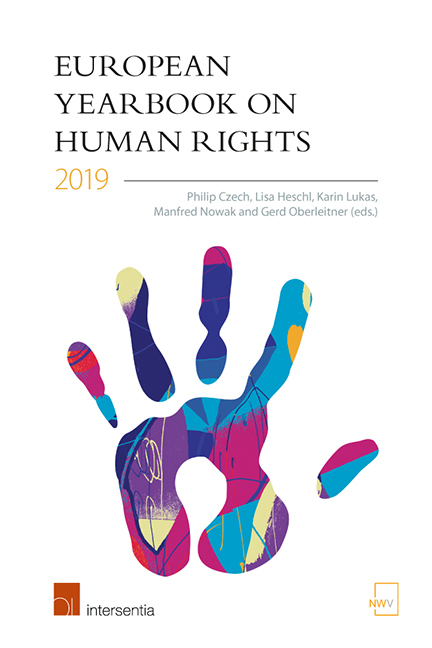Book contents
- Frontmatter
- Miscellaneous Frontmatter
- Editors’ Preface
- Contents
- List of Abbreviations
- List of Contributors
- PART I TOPIC OF THE YEAR
- PART II EU
- The Strange Case of Northern Ireland's Disappearing Rights in the EU-UK Withdrawal Negotiations
- Can Reasonable Accommodation Safeguard the Employment of People with Disabilities?
- Whistleblowing in Europe: A New Era of Legal Protections
- A Critical Take on Opinion 1/15: Is the Glass Half Full or Half Empty?
- Absolute Rightlessness Sur Place through Excessive Externalisation
- Corporate Accountability Mechanisms in EU Member States for Human Rights Abuses in Third Countries
- PART III CoE
- PART IV OSCE
- PART V REPORTS FROM THE FIELD
- PART VI OTHERS
- PART VII BOOK REVIEWS
- Index
A Critical Take on Opinion 1/15: Is the Glass Half Full or Half Empty?
from PART II - EU
Published online by Cambridge University Press: 24 January 2020
- Frontmatter
- Miscellaneous Frontmatter
- Editors’ Preface
- Contents
- List of Abbreviations
- List of Contributors
- PART I TOPIC OF THE YEAR
- PART II EU
- The Strange Case of Northern Ireland's Disappearing Rights in the EU-UK Withdrawal Negotiations
- Can Reasonable Accommodation Safeguard the Employment of People with Disabilities?
- Whistleblowing in Europe: A New Era of Legal Protections
- A Critical Take on Opinion 1/15: Is the Glass Half Full or Half Empty?
- Absolute Rightlessness Sur Place through Excessive Externalisation
- Corporate Accountability Mechanisms in EU Member States for Human Rights Abuses in Third Countries
- PART III CoE
- PART IV OSCE
- PART V REPORTS FROM THE FIELD
- PART VI OTHERS
- PART VII BOOK REVIEWS
- Index
Summary
ABSTRACT
The 9/11 attacks tilted the scale of state actions against terrorism in the Western states towards an international cooperation. In this context, sharing of information related to terrorism in a timely manner with partner states has come to the forefront of the fight against terrorism. One such source of information is that relating to people's travels and its sharing is exacerbated by states ‘concerns regarding their own citizens who have gone to fight in a conflict zone abroad such as Syria. Widely known as Passenger Name Records (PNR), this particular type of information has been collected by air carriers for their own business purposes since the 1960s. Starting with the United States of America (USA), many states including the European Union (EU) have adopted laws in the last decade allowing their public authorities to request PNR data from airlines. On the one hand, these laws are supported on the ground that the use of the data is an effective measure to counter international terrorism. On the other hand, they entail grave human rights concerns because they allow the retention and use of a vast amount of information about individuals, irrespective of the fact that no criminal suspicion has fallen upon them. Furthermore, with the help of technological advancements, PNR data can be aggregated with the information contained in other databases to produce extensive profiles of individuals. These concerns came to the centre of attention with the Court of Justice of the European Union (CJEU)'s 2017 decision (Opinion 1/15 delivered on 26 July 2017), striking down a draft international agreement to be concluded between the EU and Canada on the transfer of PNR data due to its shortcomings in complying with the human right to privacy afforded under EU law (in particular the EU Charter of Fundamental Rights (Charter)). this contribution discusses this Opinion in relation to its implications for travel surveillance and protection against indiscriminate data transfer for anti-terrorism purposes. It argues that the CJEU's observations profoundly influence more privacy-friendly data collection instruments, but at the same time they raise questions on the intersection between human rights and the use of PNR data for travel surveillance in the interest of anti-terrorism purposes.
- Type
- Chapter
- Information
- European Yearbook on Human Rights 2019 , pp. 111 - 132Publisher: IntersentiaPrint publication year: 2019



